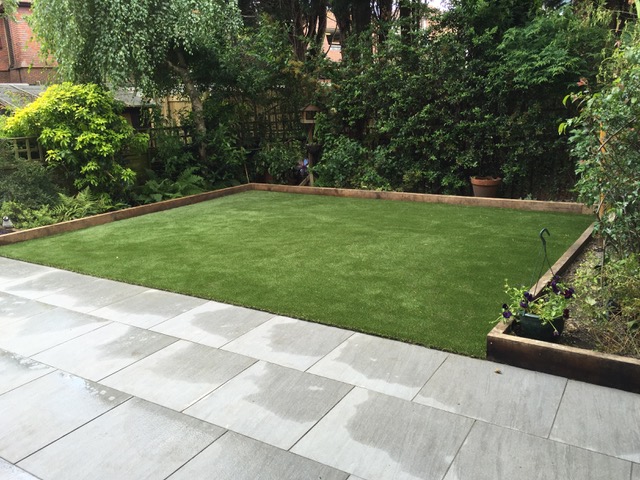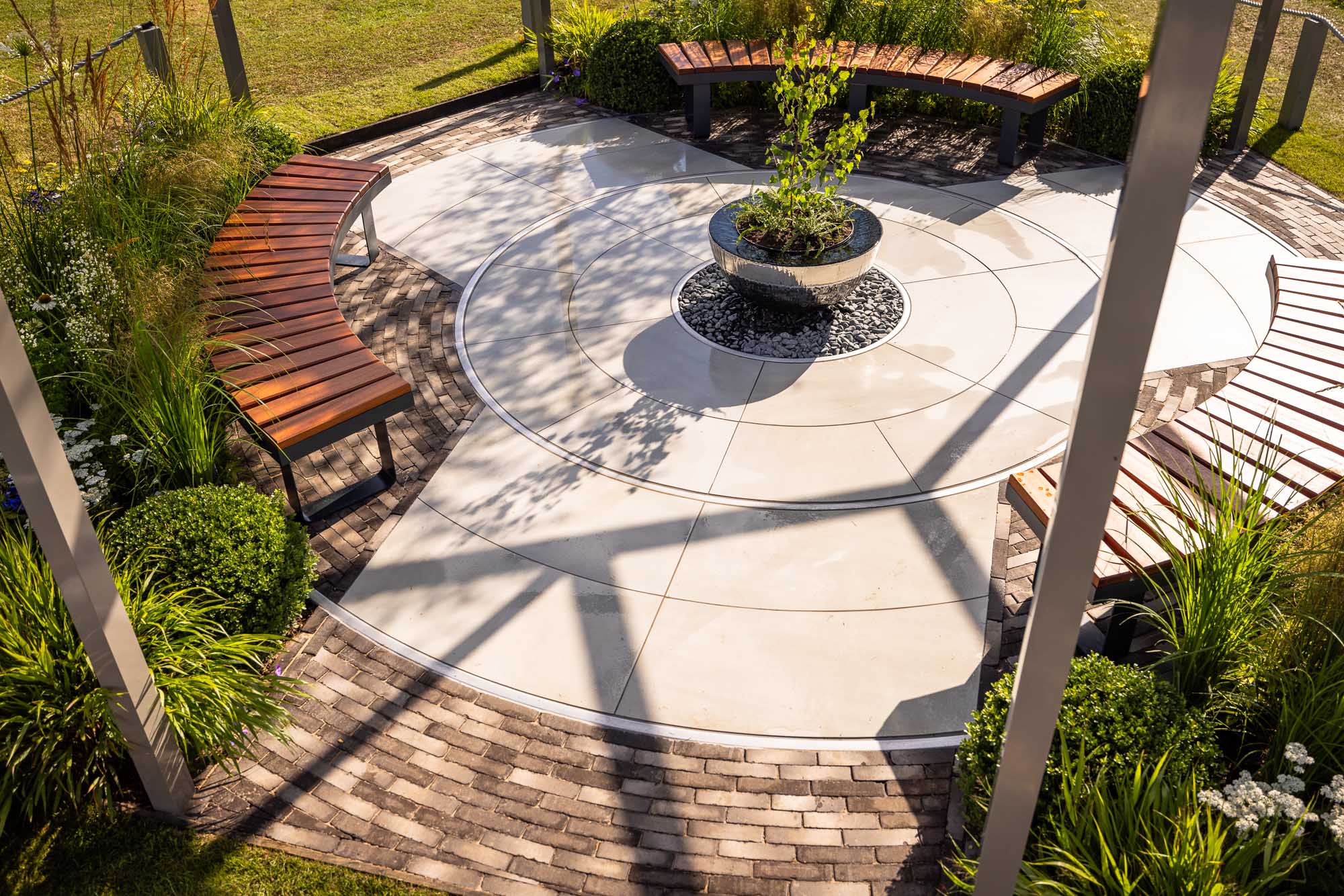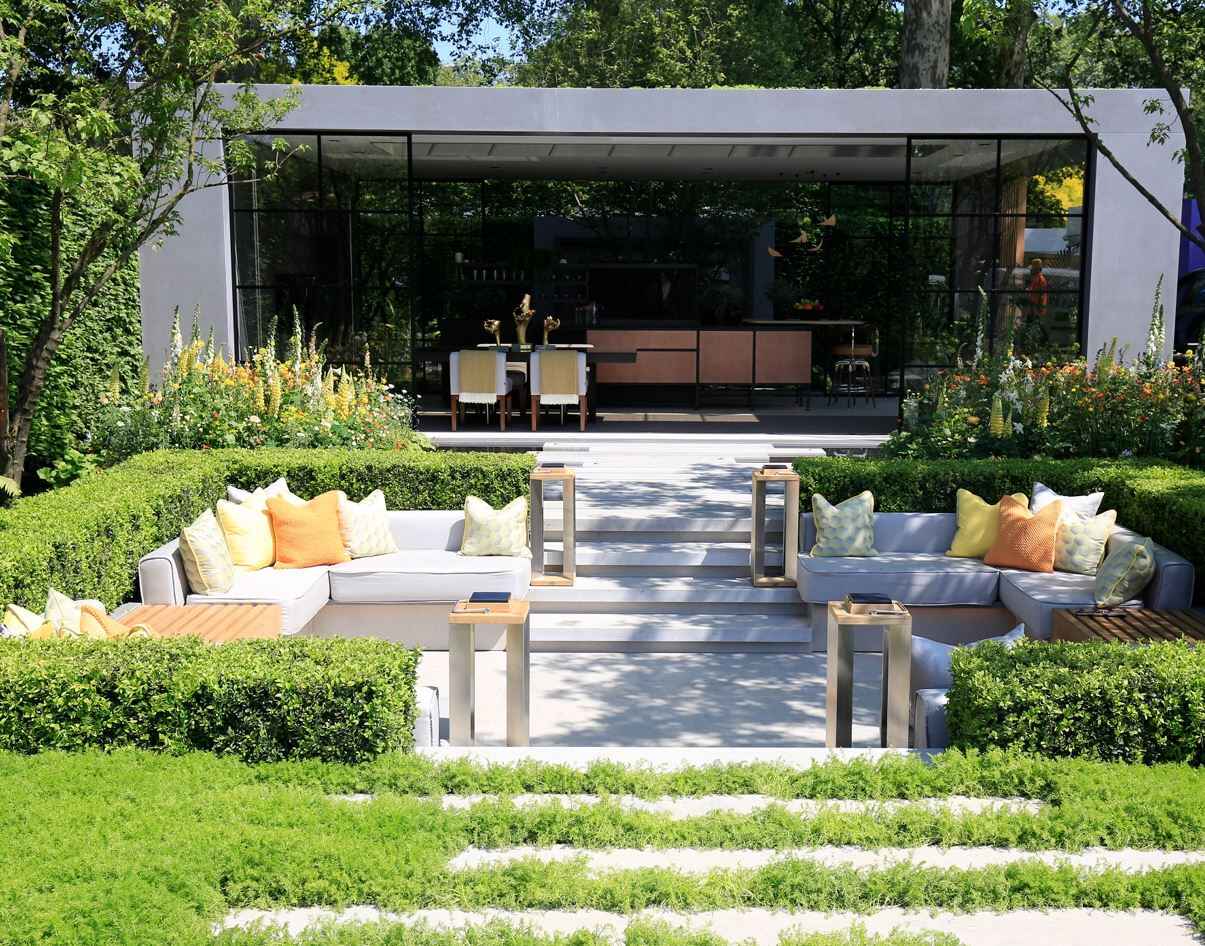Compared with natural stone, porcelain paving is a newcomer. We ask expert landscapers and designers what they think of it and what worries their clients have.
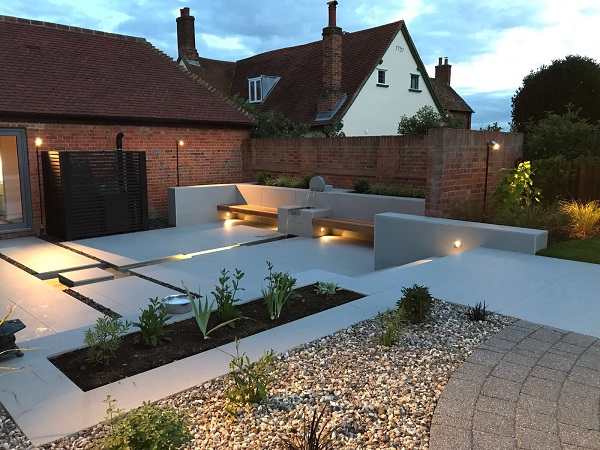
Since we first stocked porcelain paving in 2015, we’ve seen demand go through the roof. For some landscapers it's very quickly become the go-to material.
If you’re feeling cautious, however, we fully understand. Natural stone has proved its worth over centuries and you may still find a contractor reluctant to move away from a familiar, tried and tested material.
We spoke to landscapers and designers who took the plunge early on, and asked them about their experience with porcelain.
Porcelain gives client satisfaction
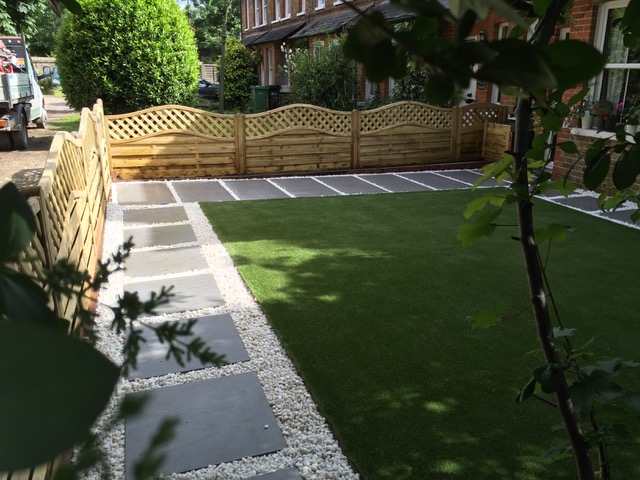
Aye and Susan Naing of Aye Gardening, Surrey, began to choose from our porcelain paving range in 2016. “We started when we kept having to advise people to seal Indian sandstone, especially in shaded areas. People have two issues when replacing paving: algae—they don't want something that gets so bad as the paving they have at the moment; and pointing that has disappeared."
The desire to make clients happy is one of the strongest reasons why landscapers choose porcelain. Craig Nester of Habitat Landscapes, Bedfordshire, suggested Urban Grey to clients for whom colour consistency was a priority. They wanted a contemporary look, and porcelain was a particularly satisfying solution because, with its very low porosity, it looks similar wet or dry, unlike some natural stones which can darken considerably when wet.
Questions about cutting
Craig loves the consistent measurements of porcelain. “We find no tolerances in the slab sizes; they’re all spot on!” he says. On top of that, porcelain has a textured rear face that makes it, in Craig’s words, “a dream to lay.”
Cutting is often something we’re asked about. There’s no doubt that porcelain is a much harder material than stone, which can cause difficulties for the unprepared.
The answer is to use the right blade. It must be specifically for cutting porcelain. “You have to be very careful cutting as porcelain can chip or break, so it takes longer,” says Susan. “But there are techniques, such as using low revs. I really like porcelain; you get a lovely sleek, contemporary look.”
Craig also finds no problem with the right equipment. “After using the material regularly, I would say that with the right installation advice, support from the supplier and, most importantly, the right tools, porcelain is easy to install. The London Stone porcelain blade really glides through on the cuts,” he says, “leaving a crisp finish to the edge.”
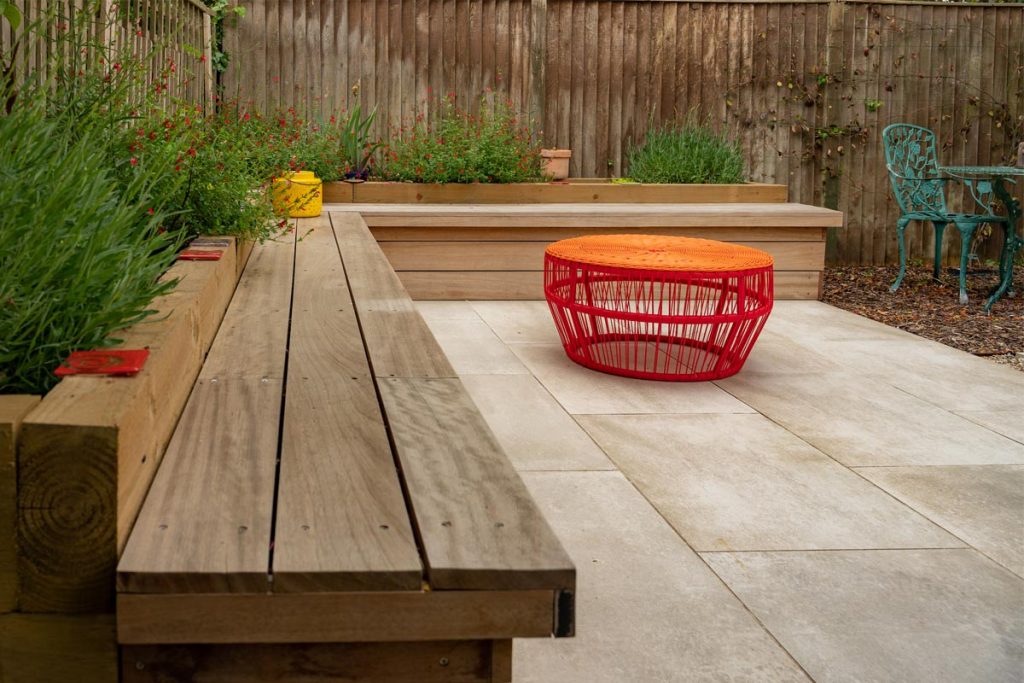
Concerns about porcelain
Clients can, understandably, be concerned about a new material and Susan has encountered some strong reactions. “Clients have a misconception about it—they think it’s slippy, like tiles indoors,” says Susan. “They like the colours but some have yet to be convinced that it’s slip-resistant.”
If this is something you’re concerned about, we recommend a visit to one of our outdoor showroom areas. All our porcelain ranges are laid to view and we'll wet it down, so you can see just how slip-resistant porcelain is.
“One couple,” adds Susan, “had been told a lot of frightening stuff about having to build up the base, or the tiles would crack easily, but we explained they’re 20mm thick, not 10mm, and suited to the outdoors.”
Guaranteed quality
No one wants to make a major purchase without some reassurance of quality, especially with so many new porcelain products coming onto the market.
Ben Powney, of Hythe Garden Landscapes, finds products with a comprehensive warranty give great peace of mind. “The industry is not used to such extensive warranties being provided on larger garden products such as paving,” he says.
Fiona Campbell, of Karen McClure Garden Design Ltd, agrees. “Sourcing the best materials is of great importance to us. Being able to offer our clients a 10-year guarantee on London Stone porcelain is invaluable. It helps us build trust with our clients, as well as giving us – the material specifiers – peace of mind that, should we need assistance from London Stone, they are there to support us.”
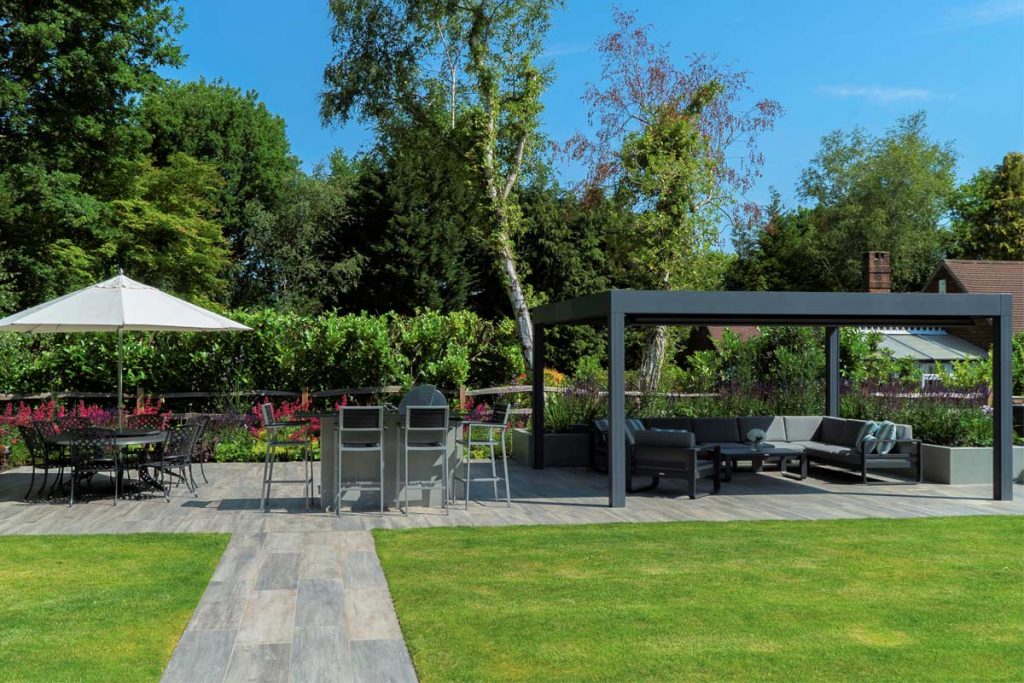
Versatile colours and styles
One thing that Susan and Aye love is that, while a very modern paving, porcelain is surprisingly adaptable. You might expect Urban Grey and Silver Grey to be used with modern houses. “But Cinder went into a traditional garden, and Trendy Black is very uniform but looked good with a Victorian house,” she says.
And modern doesn’t have to mean a single block colour, though if you want that, there’s plenty of choice. “The client who chose Silver Grey Porcelain had a patio 80m2. You wouldn't want something all the same with an area that size—you want variation. He went to the showroom and really liked the marbled effect of Silver Grey, with the mixture of tones.”
Here to help
So there you have it, from landscapers and designers who find porcelain gives their clients exactly what they need.
If you have any questions about porcelain and its suitability, or your contractor is uncertain, then please get in touch. We're experts in porcelain paving and have plenty of knowledge to share. Or why not find a landscaper experienced in porcelain paving in your local area?
A final word from Aye Landscaping: “People find porcelain very reassuring,” says Susan. “Everyone that's had it loves it.”
Post updated: April 2024


/filters:quality(60)/mediadev/media/menu-pics/all-porcelain.jpg )
/filters:quality(60)/mediadev/media/menu-pics/luxury-italian.jpg )
/filters:quality(60)/mediadev/media/menu-pics/premium-italian.jpg )
/filters:quality(60)/mediadev/media/menu-pics/budget-porcelain.jpg )
/filters:quality(60)/mediadev/media/menu-pics/large-format-porcelain.jpg )
/filters:quality(60)/mediadev/media/menu-pics/wood-effect-porcelain.jpg )
/filters:quality(60)/mediadev/media/menu-pics/porcelain-planks.jpg )
/filters:quality(60)/mediadev/media/menu-pics/porcelain-setts.jpg )
/filters:quality(60)/mediadev/media/menu-pics/browse-all-paving.jpg )
/filters:quality(60)/mediadev/media/menu-pics/stone-paving.jpg )
/filters:quality(60)/mediadev/media/menu-pics/interior-tiles.jpg )
/filters:quality(60)/mediadev/media/menu-pics/stone-effect-porcelain.png )
/filters:quality(60)/mediadev/media/menu-pics/wood-effect-porcelain.png )
/filters:quality(60)/mediadev/media/menu-pics/grey-porcelain.png )
/filters:quality(60)/mediadev/media/menu-pics/beige-porcelain.png )
/filters:quality(60)/mediadev/media/menu-pics/dark-porcelain.png )
/filters:quality(60)/mediadev/media/menu-pics/light-porcelain.png )
/filters:quality(60)/mediadev/media/menu-pics/patio-grout.jpg)
/filters:quality(60)/mediadev/media/menu-pics/primers.jpg)
/filters:quality(60)/mediadev/media/menu-pics/porcelain-blades.jpg)
/filters:quality(90)/mediadev/media/menu-pics/drainage.jpg)
/filters:quality(60)/mediadev/media/menu-pics/cleaners.jpg)
/filters:quality(60)/mediadev/media/menu-pics/all-stone-paving.jpg )
/filters:quality(60)/mediadev/media/menu-pics/all-sawn-paving.jpg )
/filters:quality(60)/mediadev/media/menu-pics/all-riven-paving.jpg )
/filters:quality(60)/mediadev/media/menu-pics/indian-sandstone.jpg )
/filters:quality(60)/mediadev/media/menu-pics/limestone-paving.jpg )
/filters:quality(60)/mediadev/media/menu-pics/granite-paving.jpg )
/filters:quality(60)/mediadev/media/menu-pics/slate-paving.jpg )
/filters:quality(60)/mediadev/media/menu-pics/yorkstone-paving.jpg )
/filters:quality(60)/mediadev/media/menu-pics/stone-pavers.jpg )
/filters:quality(60)/mediadev/media/menu-pics/cobbles-setts.jpg )
/filters:quality(60)/mediadev/media/menu-pics/plank-paving.jpg )
/filters:quality(60)/mediadev/media/menu-pics/paving-circles.jpg )
/filters:quality(60)/mediadev/media/menu-pics/bespoke-paving-1.jpg )
/filters:quality(60)/mediadev/media/menu-pics/edging-stones-1.jpg )
/filters:quality(60)/mediadev/media/menu-pics/prestige-stone.jpg )
/filters:quality(60)/mediadev/media/menu-pics/grey-blue-stone.png)
/filters:quality(60)/mediadev/media/menu-pics/swatch-black-dark.jpg )
/filters:quality(60)/mediadev/media/menu-pics/swatch-buff-beige-white.jpg )
/filters:quality(60)/mediadev/media/menu-pics/sealants.jpg)
/filters:quality(60)/mediadev/media/menu-pics/all-clay-paving.jpg )
/filters:quality(60)/mediadev/media/menu-pics/alpha-clay-pavers.jpg )
/filters:quality(60)/mediadev/media/menu-pics/cottage-garden-clay-pavers.jpg )
/filters:quality(60)/mediadev/media/menu-pics/kessel-garden-clay-pavers.jpg )
/filters:quality(60)/mediadev/media/menu-pics/artisan-clay-pavers.jpg )
/filters:quality(60)/mediadev/media/menu-pics/grey-blue-clay-paver.png )
/filters:quality(60)/mediadev/media/menu-pics/red-brown-clay-pavers.png )
/filters:quality(60)/mediadev/media/menu-pics/beige-buff-clay-pavers.png )
/filters:quality(60)/mediadev/media/menu-pics/composite-decking.jpg )
/filters:quality(60)/mediadev/media/menu-pics/designboard-decking.jpg )
/filters:quality(60)/mediadev/media/menu-pics/classic-designboard.jpg )
/filters:quality(60)/mediadev/media/menu-pics/brushed-designboard.jpg )
/filters:quality(60)/mediadev/media/menu-pics/grooved-designboard.jpg )
/filters:quality(60)/mediadev/media/menu-pics/millboard-decking.jpg )
/filters:quality(60)/mediadev/media/menu-pics/grey-decking.jpg )
/filters:quality(60)/mediadev/media/menu-pics/black-charcoal-decking.jpg)
/filters:quality(60)/mediadev/media/menu-pics/brown-decking.jpg)
/filters:quality(60)/mediadev/media/menu-pics/all-build-deck.png )
/filters:quality(60)/mediadev/media/menu-pics/stone-cladding.jpg )
/filters:quality(60)/mediadev/media/menu-pics/all-garden-walling-1.jpg )
/filters:quality(60)/mediadev/media/menu-pics/facing-bricks.jpg )
/filters:quality(60)/mediadev/media/menu-pics/garden-screening.jpg )
/filters:quality(60)/mediadev/media/menu-pics/all-steps-coping.jpg )
/filters:quality(60)/mediadev/media/menu-pics/stone-garden-steps.jpg )
/filters:quality(60)/mediadev/media/menu-pics/sawn-steps.jpg )
/filters:quality(60)/mediadev/media/menu-pics/riven-steps.jpg )
/filters:quality(60)/mediadev/media/menu-pics/yorkstone-steps.jpg )
/filters:quality(60)/mediadev/media/menu-pics/bespoke-steps.jpg )
/filters:quality(60)/mediadev/media/menu-pics/porcelain-steps.jpg )
/filters:quality(60)/mediadev/media/menu-pics/off-the-shelf.jpg )
/filters:quality(60)/mediadev/media/menu-pics/stone-coping.jpg )
/filters:quality(60)/mediadev/media/menu-pics/sawn-coping.jpg )
/filters:quality(60)/mediadev/media/menu-pics/riven-coping.jpg )
/filters:quality(60)/mediadev/media/menu-pics/yorkstone-coping.jpg )
/filters:quality(60)/mediadev/media/menu-pics/bespoke-coping.jpg )
/filters:quality(60)/mediadev/media/menu-pics/stone-pier-caps.jpg )
/filters:quality(60)/mediadev/media/menu-pics/porcelain-coping.jpg )
/filters:quality(60)/mediadev/media/menu-pics/all-bespoke-services.jpg )
/filters:quality(60)/mediadev/media/menu-pics/bespoke-paving-2.jpg )
/filters:quality(60)/mediadev/media/menu-pics/bespoke-steps-1.jpg )
/filters:quality(60)/mediadev/media/menu-pics/bespoke-coping-1.jpg )
/filters:quality(60)/mediadev/media/menu-pics/edge-profiles.jpg )
/filters:quality(60)/mediadev/media/menu-pics/masonry-services.jpg )
/filters:quality(60)/mediadev/media/menu-pics/deluxe-pergolas.jpg )
/filters:quality(60)/mediadev/media/menu-pics/proteus-pergolas.jpg )


